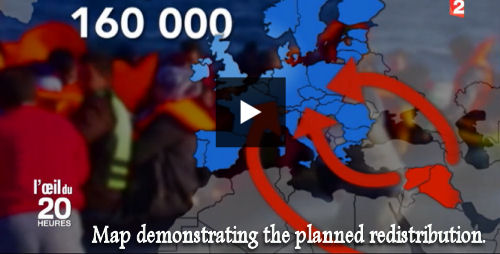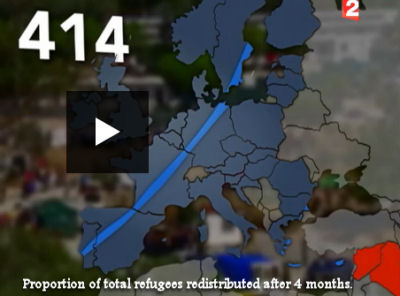

Four months ago, France committed to taking 30,700 refugees over two years, but after four months only 62 refugees have been sent from the processing centres. The European Union planned on 11 reception centers in the 'hotspots' of Italy and Greece, but there are only 4 functioning ones. Seven countries voted against the redistribution of immigrants by the EU and one is taking the EU to court for breaching the rights of national parliaments and the European parliament itself. Greece says it was depending on other EU countries sending reinforcements to its coastguard, but so far, the number of reinforcements has been minute, with France far in the lead. This article is a translation of a news item from France 2 and the illustrations are taken from that item. (Translation by Sheila Newman)

L'oeil du 20h [France2, 8pm News special] of 27 January 2016, puts European cohesion in the face of migrants to the test. One news item chases the next and we forget quickly. Four months ago, Europe came to an agreement on how to redistribute 160,000 migrants. Where are we with this today?
In order to solve the migrant crisis, Europe decreed a general mobilisation. Jean-Claude Juncker, President of the European Commission (9 September 2015) said: Enough poetry, enough rhetoric. We have to act now."
This was more than four months ago. Did the 28 countries of the European Union act on this emergency plan? A year ago, a million migrants have crossed the Mediteranean, but the European Plan only concerns a small proportion of them. The 28 member countries have two years to allocate 160,000 refugees originating from three countries, Syria, Iraq and Eritrea.

A the end of 4 months, only 414 have been allocated in accordance with the plan. How can this be explained? First problem, according to our understanding, one quarter of member countries of the EU have not allocated any place for this refugeee program.
Austria, Croatia, the Czech Republic, Denmark, Hungary, Estonia and Slovakia. Special mention for Slovakia, which actually issued a complaint [against immigrant quotas to the EU Court of Justice] [1] against the plan to redistribute refugees.
And is France playing the game? Our country committed to opening the doors to 30,700 refugees over two years. State of play after 4 months: Only 62 people have been taken. That's not much, but, according to the Minister of the Interior, [2] France is waiting for the EU to allocate more to it.
GOVERNMENT SPOKESPERSON FOR THE MINISTER OF THE INTERIOR: "Over the last three months we have indicated that we have more than 900 places that could be used. But today the number of arrivals is very much less than the capacity we have."
REPORTER: So you are being sent fewer people than France ...
GOVERNMENT SPOKESPERSON FOR THE MINISTER OF THE INTERIOR: Than the number we could take.

REPORTER: So the problem lies upstream in what Europe calls 'the Hotspots' - those redistribution centers where the immigrants are registered and orientated. The European Plan required eleven in the two countries on the front lines: Italy and Greece. There are only four functioning ones, however: three in Italy and one in Greece.
Why such a delay in a country where 80 per cent of refugees arrive? We contacted the Greek Minister for the Interior. He puts the blame back on his European partners.
GREEK MINISTER OF THE INTERIOR: We need more coast guards. ... Help from European countries is taking too long to arrive.
REPORTER: It's true that seven countries have sent no money to help processing function in the 'hotspots'. Other countries have only sent reinforcements that could be counted on one hand. Four agents from Belgium, only two from Finland. France, at 59, has sent the most.
Ten days ago, Jean-Claude Junker called European countries to order: "Each week 1200 more immigrants arrive in Greece. We need to begin implementing the emergency plan. While we are waiting, the people-smugglers are prospering.
Original article accompanying filmed report
Crise des migrants, l'Europe en fait-elle assez ?
Source: http://blog.francetvinfo.fr/oeil-20h/ ( If you don't find it, seek the title with the date: 27 January 2016.)
Pour résoudre la crise des migrants, l'Europe a décrété la mobilisation générale. Il y a un peu plus de quatre mois, le président de la Commission européenne, Jean-Claude Juncker exhortait les pays membres de l'UE à "agir, maintenant." Nous avons voulu comparer les efforts réalisés par les 28 pays membres.
Depuis un an, un peu plus d'un million de migrants ont traversé la Méditerranée. Le plan européen ne concerne qu'une petite partie d'entre eux, soit 160 000 réfugiés originaires de Syrie, d'Irak et d'Erythrée. Au bout de quatre mois, seuls 414 migrants ont été accueillis dans le cadre de ce programme. Comment l'expliquer ?
Soixante-deux personnes accueillies en France
Premièrement, un quart des Etats-membres n'ont à ce jour prévu aucune place d'accueil pour les réfugiés de ce programme. C'est le cas de l'Autriche, la Croatie, la République-Tchèque, le Danemark, la Hongrie, l'Estonie et la Slovénie. La Slovaquie a même déposé un recours contre le plan de répartition.
Qu'en est-il de la France ? Notre pays s’est engagé à ouvrir ses portes à 30 700 réfugiés sur deux ans. Mais au bout de 4 mois, seulement 62 personnes ont été accueillies. C’est peu, mais selon le ministère de l’Intérieur, la France attend que l’Europe lui en confie plus.
Le problème se situerait donc en amont, dans ce que l’Europe appelle des “hotspots”, ces centres de répartition où sont enregistrés et orientés les migrants. Le plan européen en prévoit 11 dans les deux pays qui se trouvent en première ligne : l’Italie et la Grèce. Mais seuls quatre de ces "hotspots" fonctionnent : trois en Italie et seulement un en Grèce. Le ministre de l'intérieur grec rejette la faute sur ses partenaires européens. Il n'a pas tort. Sept pays n’ont dépêché aucun agent pour faire fonctionner les "hotspots". D’autres états se sont contentés d’envoyer des renforts qui se comptent sur les doigts d’une main : 4 pour la Belgique et seulement 2 pour la Finlande. La France, elle en a dépêché 59. Soit presque autant de réfugiés qui ont été accueillis.
Il y a 10 jours, Jean-Claude Juncker a rappelé à l’ordre les Pays européens. Chaque semaine, 12 000 migrants supplémentaires arrivent en Grèce. Il y a urgence à ce que démarre le plan d’urgence. Car en attendant, ce sont les filières clandestines qui prospèrent.
NOTES
[1] http://www.rts.ch/info/monde/7303341-la-slovaquie-depose-un-recours-en-justice-contre-les-quotas-de-migrants.html "Request that the EU decision be annuled. 'The decision was adopted via a majority of voices, despite the opposition of some member countries,' explained Robert Fico. 'We are asking the ocurt to annule the decision, to declare it invalid, and to oblige the Council to pay the court costs,' he continued. 'We consider also that this case represents an attack on the rights of national parliaments and on the European Parliament,' he added.
[2] [France does not have a Ministry for Immigration; immigrants are usually processed regionally via local Prefectures- Candobetter.net Editor.]

Comments
anon (not verified)
Fri, 2016-01-29 13:21
Permalink
A human tsunami
Such huge numbers of people suddenly arriving and moving into a country is unsustainable, and inherently a cause of chaos and destruction. It's an emergency, and unregulated arrivals of "migrants" will naturally increase lawlessness, an overloading of resources, disease and crime. This "migration crisis" is back-filling established countries, with our human population overload. It's a human tsunami, a flood of humanity, with nowhere to go.
Global population has doubled since 1970s, and any conflicts or wars will mean that humanity will implode, with no new frontiers to invade and conquer, and no new colonies to safely settle in.
The UN Refugee Convention is totally out-dated and passed its use-by date. After World War 2, there were under 3 billion people in the world, and refugees from Europe and the Holocaust were able to be welcomed. Now, it's about prying open the doors of weaker, Western countries, to back-fill those leaving war zones. Between 20 to 30 million people were displaced in Europe alone – "one of the greatest population movements of history" as one US State Department report described it at the end of the war.
There are over 60 million refugees today, far exceeding the numbers after World War 2. The convention deeply distorts our understanding of 21st-century immigration. Today even people fleeing totalitarianism typically believe they are doing so for economic reasons, not political ones.
People are also increasingly being forced to abandon their homes as a result of the interaction between the effects of population growth, food and energy insecurity as well as water scarcity, with climate change – the key defining problem of our times – clearly accelerating all other trends.
The five wealthiest countries on the Arabian Peninsula, that is, Saudi Arabia, UAE, Qatar, Kuwait and Bahrain, not one has taken in a single refugee from Syria. Instead, they have argued that accepting large numbers of Syrians is a threat to their safety, as terrorists could be hiding within an influx of people.
Dennis K
Sat, 2016-01-30 15:19
Permalink
Gulf states are not selfish, they are prudent
I think the neighbouring countries are closing their borders to the Syrians, to a degree, because they understand what they are bringing in far, far better than the naive and silly Europeans.
Europeans are beholden to a religion which mandates that you can't question whether changing the composition of your nation in this manner could be undesirable. The Gulf States have no such religion, and therefore must act as if there is no negative consequence apart from the initial financial burden.
Sheila Newman
Sun, 2016-01-31 18:03
Permalink
Gulf states diabolical; European leaders faulty, not Europeans
I don't think the Europeans have that religion; I think they are being forced into this intake by their leaders - whose religion is money and power. Merkel did not do this to benefit her people. (One wonders if she even wanted to do it; it seems so barmy; was she being forced through blackmail or such.) The Gulf States, like the US, are financing these wars in the Middle East. They are not exactly friendly to the countries originating these refugees and economic immigrants. But Syria has historically taken in many immigrants/refugees (who now fight in her army), as has Jordan.
We should be learning from this: Our leaders are causing racist and religious divisions, then they train us to say that 'we' are.
Sheila Newman
Sat, 2016-02-06 20:44
Permalink
The Weaponisation of the Refugee: Coercive Engineered Migration
"In the book Weapons of Mass Migration: Forced Displacement, Coercion and Foreign Policy, Kelly M. Greenhill, US foreign policy consultant, argues that coercive engineered migration is a strategy which has been used by governments to gain concessions from other governments. In other words, governments often use refugees as weapons in order to exert pressure on other governments for political ends. Greenhill documents over 59 examples of refugees being used as weapons since the Second World War.
While there are undoubtedly many women and children and innocent victims of NATO/Zionist fomented war among the flux of people migrating to Europe who deserve all the help they can get, it is deeply reactionary and dishonest to ignore the obvious instrumentalisation of migration by imperialism. Rational and honest analysis of this complex phenomenon tends to prevail in developing countries such as Russia and Iran, whose press agencies have provided extensive evidence of this problem. However, spurious political correctness often stifles constructive debate in Western countries with some analysts such as this author being slandered on social media as ‘fascists’ and ‘racists’ by soi-disant ‘leftists’ for discussing these facts. George Soros and company would certainly agree with them." Cited in Gearóid Ó Colmáin, "The Weaponisation of the Refugee: Coercive Engineered Migration: Zionism's War on Europe, Part 1."
Read more
Add comment